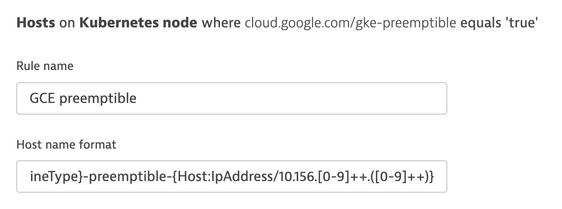- Dynatrace Community
- Ask
- Container platforms
- Re: HOST ID generation for GCP preemptible K8s nodes
- Subscribe to RSS Feed
- Mark Topic as New
- Mark Topic as Read
- Pin this Topic for Current User
- Printer Friendly Page
- Mark as New
- Subscribe to RSS Feed
- Permalink
20 Mar 2023 11:40 AM - edited 22 Mar 2023 09:29 AM
Hello,
with oneagent options you can set the HOST ID generation source to IP Adresses. We have done this for preemptible K8s nodes on GCP to avoid the creation of hundreds of hosts in Dynatrace (an ever growing list since preemptible nodes can go and disappear at any time).
After applying the parameter in the Dynatrace Operator I'd have expected the list of hosts becoming shorter but it seems that this option considers all IP addresses of the host and therefore doesn't really have an impact.
Specifically I do have a host naming rule that takes the last octed of the host IP and renames the host:
However I still get two hosts created over the course of time, where I'd have expected only one:
I believe this is due to the fact that the hosts also get different public IP addresses?
(.33 vs. .198)
host1:
host2:
Would be great if someone could confirm this how it is done in detail? Are all addresses used or one? Which one?
The documentation of the HOST ID parameter says ip-addresses (pl.), though the description says ip-address (sing.). Also the Naming rule only understands one Host:ipAddress.
Thanks!
Solved! Go to Solution.
- Labels:
-
google cloud platform
-
kubernetes
-
oneagent
- Mark as New
- Subscribe to RSS Feed
- Permalink
13 Apr 2023 04:58 PM
it appears that yes it will take into account all the IPS, you could add in the regex that grabs one of the desired IPs, but that might be problematic as the desired IP could be in different positions.
- Mark as New
- Subscribe to RSS Feed
- Permalink
20 Apr 2023 10:10 AM
The funny inconsistent part is that in the Dynatrace UI on the classic host view the property "IP Addresses" consists of one IP (while public GCE IP addresses are listed seperately):
On the new vie those are merged:
And when extracting IP Adresses in host-naming rules it also just seems to be one IP address (the private one) .... oh my!
- Mark as New
- Subscribe to RSS Feed
- Permalink
13 Apr 2023 06:59 PM - edited 13 Apr 2023 07:04 PM
I got confirmation from lab/support that for the HOST ID generation ALL IPs of an interface are used to create the ID.
This renders that feature unusable for GCP K8s nodes (preemptible) as there seem to be alias addresses on one interface, like so
eth0: 192.168.100.10
eth0:1: <public ip random 1>
eth0:2: <public ip random 2>
So although one can assign a fixed pool of private addresses the alias public addresses are random, thus the HOST ID will change all the time.
Featured Posts






